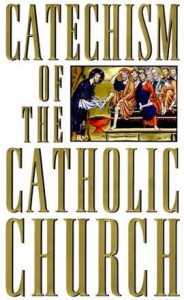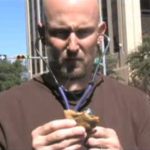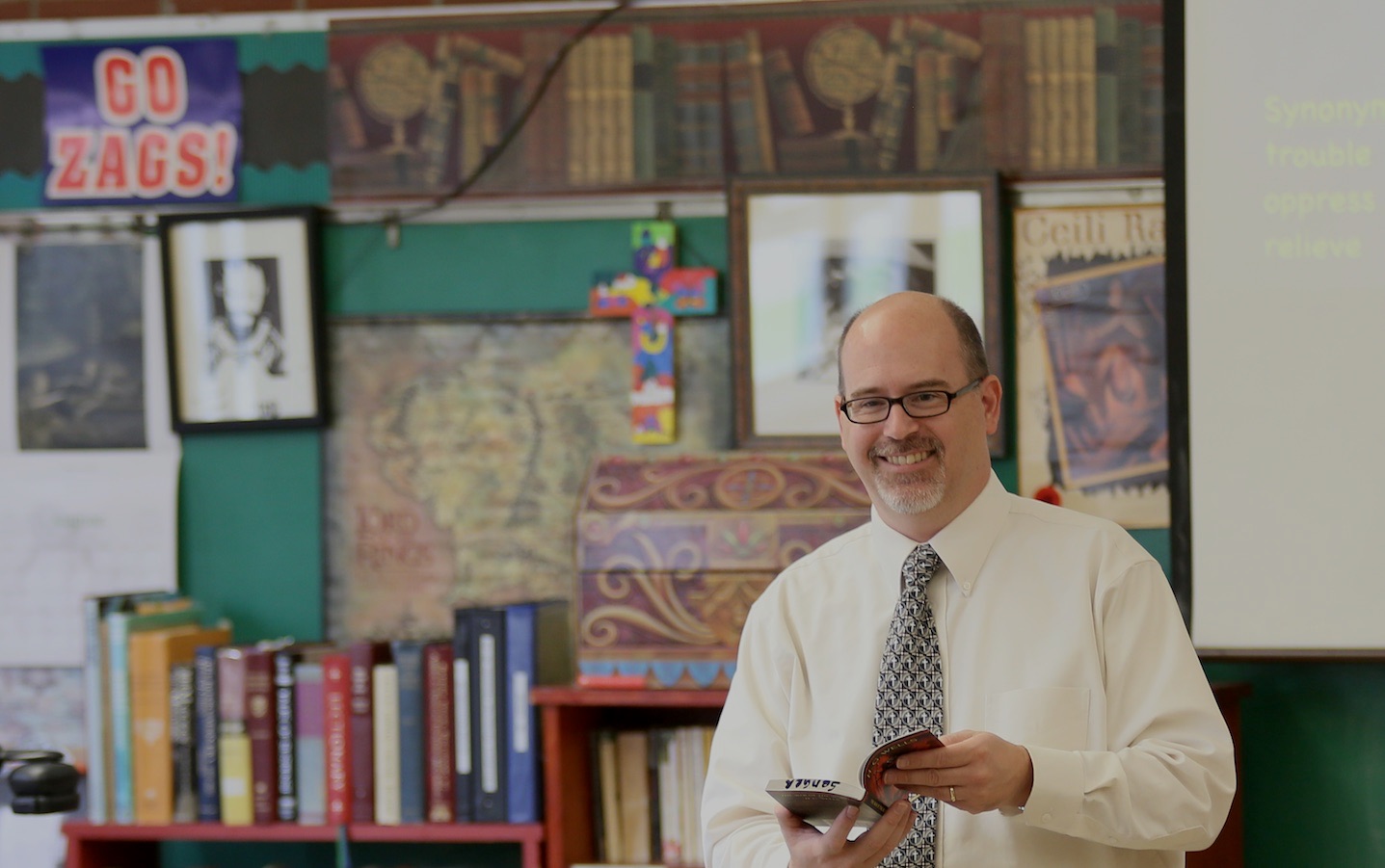Our kids can never get enough guidance in prayer. The following video from St. Ignatius College Prep in San Francisco is a relevant, practical example of the Jesuit examen and might help your students understand this prayer:
A 5-Minute Video Summary of Catholic Teaching
In marketing parlance, there is a concept known as the “elevator speech,” in which one tries to deliver a compelling idea in less than two minutes, or the length of an elevator ride. Archbishop Daniel Pilarczyk comes close to an elevator speech summary of Catholic beliefs in this video from TeamRCIA:
Archbishop Daniel Pilarczyk from TeamRCIA on Vimeo.
Okay, so the speech was eight minutes, but the summary didn’t begin until about 3 minutes in. In any case, it’s a terrific distillation of Catholic teaching. It’s simple enough that it could be presented to young children, yet profound enough that it could be meditated upon. Here’s my transcription of just the summary portion of the archbishop’s presentation:
The most important thing in the world is that God is madly in love with us. There’s no reason for it, God just loves us. That’s why there is a world. That’s why each of us is here. God has loved us for a long time, ever since the beginning of human history. And God has never stopped loving us, even when human beings made a mess of things and did their best to forget about God’s love for them.
But that’s not all.
God loves us so much that he wanted to be one of us. In Jesus God became a human being not just to tell us who and what God is, but also to show us who and what we are supposed to be. Jesus was faithful to that mission even when it cost him his life.
But that’s not all.
Jesus is still alive, because his heavenly father wouldn’t let him stay dead. Jesus is with us still and has sent us the Holy Spirit that unites him and the Father to make us live God’s life in addition to our own. To be part of that life, we don’t have to earn it, and we don’t have to deserve it. All we have to do is accept what Jesus offers us, and then act in accord with what he has made us to be.
Jesus has established a community of those who have accepted him so that none of us ever needs to be alone. Jesus nourishes that community with himself and he marks every major moment in the life of every member with his personal action in the sacraments.
But even that is not all.
God loves us so much that this life of Jesus that we have been given to share will never end. God wants us with him forever. No matter how confusing and painful our life may be, we have God’s guarantee of final fulfillment. In the most literal sense, God has promised us that everything is going to be all right. God invites us to take constant joy in hope.
But there’s still more.
Because we share the life of Jesus, we share the mission of Jesus. Each of us is called to extend the love and care of the Lord to those around us. We may not seem as individuals to have all that much to offer, but what we do have to offer is eternally important because it’s not just ourselves that we offer, but the Lord Jesus himself. The Lord has chosen to need each one of us to get his work done. Nobody’s life is insignificant.
The long and the short of it is that God is crazy about us, and once we accept that, everything else falls into place.
Catholic Teacher’s Essential Bookshelf – The Catechism

Book 2: The Catechism of the Catholic Church
In Part One of the Catholic Teacher’s Bookshelf we looked at the Bible. This article examines the Catechism of the Catholic Church, which Pope John Paul II called a “systematic presentation of the faith and of Catholic doctrine.” If you’re a Catholic school teacher, you probably already have a copy of the Catechism. It’s an absolutely essential reference book for answering student questions and learning about our faith.
Background
A catechism is book which attempts to make the fundamental truths of the faith accessible to the reader. The Catechism of the Catholic Church (CCC) is what is known as a universal catechism, which means it is intended to be used to create national or local catechisms. An example of a national catechism would be the United States Catechism for Adults. written and published by the United States Conference of Catholic Bishops. According the USCCB page on the Catechism. the CCC was written by a committee of cardinals and bishops between 1986 and 1992, and is intended to “assist those who have the duty to catechize.”
Structure and Use
The CCC is structured on four “pillars”:
- The Creed: What the Church believes
- The Sacraments: What the Church celebrates
- The Commandments: What the Church lives
- Prayer: What the Church prays
All religion textbooks in Catholic schools strive to be in conformity with the CCC, but that doesn’t mean a teacher can ignore the universal catechism and rely merely on the background materials in the teacher’s edition. It is well worth the effort, both professionally and personally, to spend time meditating on and attempting to understand the truths expressed in the Catechism.
If your copy of the Catechism has been gathering dust on a bookshelf, maybe now would be a good time to brush up on an aspect of the faith that you’re not familiar with. If you don’t yet have a copy of the Catechism, perhaps it’s time pick one up and begin to study it. In any case, don’t ignore this valuable catechetical resource when planning your religion lessons.
Catechism Resources
- What Catholics Believe – a 30-part audio/pdf series written by Dr. Peter Kreeft
- Quizzes on the Catechism from the USCCB
- How to Read the Catechism of the Catholic Church in One Year – a pdf file from the Church of the Good Shephard in Camp Hill, PA
A Catholic Prayer for Economic Hardship
Here’s a prayer from the back of a holy card that you might wish to share with your school community:
Heavenly Father,
it is symptomatic of our life today
that economics play a large part in it.
People labor zealously for a wage
so that they can acquire the needs of life.They also work for
the so-called luxuries of life,
for the opportunity to have more leisure
to develop themselves in ways,
and to keep up with
their particular state of life.Right now,
I find myself in a bad economic condition.
I just cannot seem to make enough money
to meet my obligations.
Please help me in this dangerous situation.Teach me to live within my means
while at the same time
striving to increase those means.
Let me never lose heart
but continue to press on.Most of all, inspire me
to seek first Your kingdom
in the knowledge that everything else
will be given me together with it.
In Jesus Christ’s name I pray,
who lives and reigns with the Father and the Holy Spirit
One God
forever and ever.
You can purchase the holy card from Aquinas & More.
101 Practical Fasting Ideas for Lent

[Note: I’ve updated this list with 10 more ideas at One Catholic Life – February 17, 2010]
Fasting, praying and almsgiving are the three penitential practices that we are asked to engage in during Lent. In addition to fasting and abstaining with the rest of the Church on Ash Wednesday and the Fridays of Lent, we are also challenged to make individual sacrifices appropriate to our own spiritual condition. However, before we choose something to give up for Lent, it’s important to assess our current spiritual state:
- What habits do I engage in that are destructive to my spiritual health?
- To what material things am I too attached?
- What areas in my life are unbalanced?
- To what do I devote too much or not enough time?
Only after asking questions like these are we are ready to decide what to give up or what to add to our lives during Lent. The following list is meant to be an aid in this process. Use it as you need based on your current circumstances.
“Through fasting and praying, we allow Him to come and satisfy the deepest hunger that we experience in the depths of our being: the hunger and thirst for God.”
–Pope Benedict, Lenten message, 2009
1-10: The Usuals:
- Give up candy/sweets.
- Give up television time.
- Give up eating snacks between meals.
- Give up or limit soda or coffee.
- Give up or limit video games.
- Spend more time with family.
- Give to the poor.
- Do an extra chore each day.
- Perform a random act of kindness.
- Spend more time in prayer.
11-20: Prayer
- Pray a book of scripture using lectio divina.
- Attend Mass on a weekday (every day if possible).
- Pray the rosary each day, alone or with your family.
- Prayerfully read Abandonment to Divine Providence.
- Make a special prayer notebook and list all the people in your life who need prayers; pray for them each day. Add someone new every day.
- Learn to pray the Liturgy of the Hours.
- Make a commitment to attend Eucharistic Adoration regularly.
- Commit to examining your conscience each evening.
- Pray the Jesus Prayer throughout the day.
- Pray the Angelus each day at noon.
21-30: For Those Addicted to Popular Culture
- Switch from regular radio to Christian music radio or Catholic talk radio.
- Avoid shows with gratuitous sex or violence.
- Give up or limit watching sports on television.
- Listen to only classical music for the next 40 days.
- Drive to work in silence each day.
- Read a work of classic literature.
- Read a Catholic classic.
- Read a story to a child.
- Sit in fifteen minutes of silence each day.
- Write a letter to God each day.
31-40: For Internet Users/Bloggers
- Set time limits on overall online time.
- Limit Facebook time.
- Limit Myspace time.
- Resist making or adding to lists that rank people.
- Share one spiritual video with your online network once a week.
- Blog about the poor once a week.
- Add a spiritual blog to your blog reader.
- Subscribe to a prayer podcast like Pray As You Go or Pray Station Portable.
- Leave an encouraging or positive comment on a different blog each day.
- Help a new blogger by sending traffic their way.
41-50: For Those Who Need to Be More Grateful
- Each week, write a letter of thanks to a different member of the clergy, beginning with your bishop and parish priest.
- Each week write a thank-you note to your parents.
- Write a poem of praise for each person in your family.
- Get a stack of sticky-notes and write one sentence of thanks each day and stick it to the bedroom door of each person in your family so that by Easter they each have 40 sticky-notes.
- Find the psalms of thanksgiving or praise in the Bible and pray them.
- Write a list of the ways God has blessed you and add to it each day. This could be done in a notebook or on a big poster hanging on your wall.
- At dinner each evening ask your family to share one thing for which they are grateful.
- Make a CD or iPod playlist of praise and worship music and listen to it each day.
- Make a point of saying “Thank You” a certain number of times per day.
- Help your children write thank you letters to their teachers.
51-60: For Those With Lives Out of Balance
- Go for a walk each day with a loved one and talk about life and faith.
- Take the kids to the park each week for some carefree time.
- Give up fast food and give the money to charity.
- Exercise each day.
- Spend at least half an hour each day in meaningful conversation with your spouse.
- Go on a Lenten retreat.
- Pray with Sacred Space each day.
- Commit to a daily 3 Minute Retreat.
- Begin the online 34-week Retreat for Everyday Life.
- Give up your most unhealthy habit.
61-70: For Those Who Need Spiritual Nourishment
- Read the documents of Vatican II, especially Gaudium et Spes.
- Read The Cathechism of the Catholic Church or The United States Catholic Catechism for Adults.
- Sign up for adult formation classes at a local parish.
- Join a Bible study.
- Attend Stations of the Cross at a local parish.
- Find a spiritual director.
- Read The Imitation of Christ.
- Listen to a free Catholic audio book from Maria Lectrix.
- Read Introduction to the Devout Life.
- Read a spiritual autobiography (i.e., Augustine’s Confessions, Story of a Soul, Journal of a Soul, Witness to Hope)
71-80: For Those Who Need to Increase Their Service to the Needy
- Volunteer at soup kitchen or other food program.
- Coordinate a food drive at your parish, school or place of employment.
- Find out who in your parish is sick and offer to visit them or bring them food.
- Call your local Catholic Charities office and volunteer.
- Begin making visits to a nursing home.
- Help an elderly or disabled person in your neighborhood with yard work or other difficult chores.
- Become a hospital volunteer.
- Become part of a prison ministry team.
- Coordinate a clothing drive.
- Make rosaries and give them away.
81-90: For Those Who Need to Be More Active in Their Parish
- Become a lector.
- Volunteer to become an Extraordinary Minister of the Eucharist
- Volunteer to help with the parish youth group.
- After each Mass stay awhile and introduce yourself to someone you don’t know.
- Join the Knights of Columbus.
- Offer to be a Confirmation sponsor.
- Volunteer to be an usher.
- Offer to help with funeral dinners.
- Help with the RCIA program.
- Volunteer to do lawn work, cleaning or other needed maintenance for the parish.
90-101: Potpourri
- Begin to receive the Sacrament of Penance weekly.
- Give up foul language.
- Give up gossiping.
- Read and study Healing the Culture.
- Study the life of a different saint each day.
- Cook dinner each night for your family if someone else normally does.
- Pray the Chaplet of Divine Mercy.
- Carry extra food in your car, purse or backpack to give to street corner beggars.
- Begin practicing socially conscious investing.
- Spend a week meditating on each of the seven principles of Catholic social teaching.
- Make breakfast each morning for your family.
Conclusion
Lent is a tremendous opportunity for spiritual growth. I hope these suggestions re-energize you on your spiritual journey. If you try one or more of these ideas, or if you’d like to share your own Lenten practices, please leave a comment.
The Magic Stethoscope

Here’s a fun video for your weekend, courtesy of a friend from Twitter.


